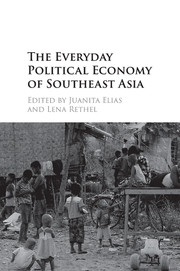Book contents
- Frontmatter
- Epigraph
- Contents
- List of Figures and Map
- List of Tables
- Notes on Contributors
- Acknowledgements
- Part I Introduction
- Part II From Development to Multiple Modernities
- 2 Policies and Negotiated Everyday Living: A View from the Margins of Development in Thailand and Vietnam
- 3 Neoliberalism, Resource Governance and the Everyday Politics of Protests in the Philippines
- 4 Everyday Agents of Change: Trade Unions in Myanmar
- Part III Widening and Deepening Markets
- Part IV People, Mobilities and Work
- Part V Conclusion
- Index
- References
2 - Policies and Negotiated Everyday Living: A View from the Margins of Development in Thailand and Vietnam
from Part II - From Development to Multiple Modernities
Published online by Cambridge University Press: 05 August 2016
- Frontmatter
- Epigraph
- Contents
- List of Figures and Map
- List of Tables
- Notes on Contributors
- Acknowledgements
- Part I Introduction
- Part II From Development to Multiple Modernities
- 2 Policies and Negotiated Everyday Living: A View from the Margins of Development in Thailand and Vietnam
- 3 Neoliberalism, Resource Governance and the Everyday Politics of Protests in the Philippines
- 4 Everyday Agents of Change: Trade Unions in Myanmar
- Part III Widening and Deepening Markets
- Part IV People, Mobilities and Work
- Part V Conclusion
- Index
- References
Summary
Introduction: Vernacular Modernities and Directional Goals
This chapter explores, through the everyday lives of urban migrants in Vietnam and rural dwellers in Thailand, a puzzle when it comes to understanding the intersection between modernization as a project and modernization as a practice. It is evident that most of the populations of Southeast Asia subscribe, in broad terms, to modernization ends. Their personal sacrifices to achieve material prosperity are both remarkable and humbling. At the same time, detailed investigation shows that they embrace and orchestrate this process of social and economic transformation in ways that run counter to and sometimes against both state-led intentions and simplistic views as to the path that is followed. So, on the one hand, we see in the everyday actions of ordinary people an undoubted, irrepressible enthusiasm for modernization. But in the details of how they go about achieving this, we discern not a resistance to modernization but rather a resistance to the modernization project.
This illustrates a point highlighted by the political economist Dani Rodrik, who suggests that the ‘central economic paradox of our time is that “development” is working while “development policy” is not … [and] we are [therefore] faced with the confluence of two seemingly contradictory trends’ (2007: 85). To address this paradox, Rodrik makes a case for heterodoxy in understanding international development achievements and failure. This chapter will seek to address the paradox/puzzle in another way: by looking at the explanatory gap between development as policy as envisioned and orchestrated by states and development as practice as pursued and given meaning by people in their everyday actions.
To provide some structure to the empirical evidence and discussion that follows, a simplified two-by-two matrix provides a starting point (Table 2.1). This highlights two binaries: between directional history and vernacular modernities, on the one hand, and everyday practices and state intentionalities, on the other. The four resulting categories inevitably bleed into each other; they are not viewed as neat and tightly bordered but permeable. Indeed, it is at the margins – at the points of contact – where much of interest lies. The matrix serves a purpose in highlighting the intersections and tensions with which the chapter is concerned:
- Type
- Chapter
- Information
- The Everyday Political Economy of Southeast Asia , pp. 27 - 48Publisher: Cambridge University PressPrint publication year: 2016
References
- 5
- Cited by

